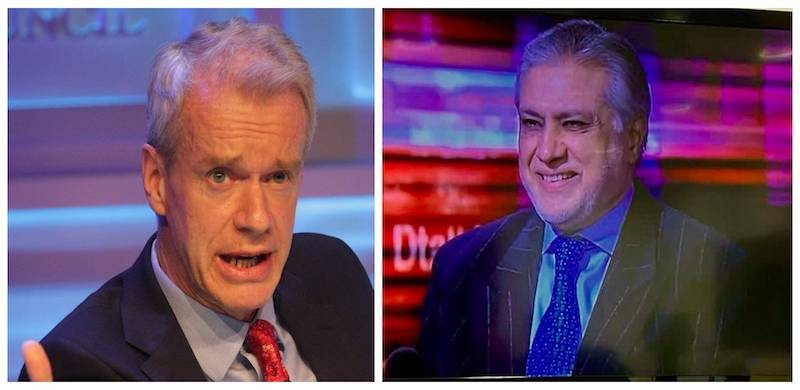
In a statement, the British Broadcasting Corporation (BBC) has accepted that it should have been made clear during former finance minister of Pakistan Ishaq Dar’s interview on HARDtalk with Stephen Sackur last year that the European Union report on the 2018 general elections never referred to the elections as 'credible', and the comments were actually made during a press conference by Chief Observer of the EU Monitors Michael Gahler.
The BBC has now published on its website a clarification after Ishaq Dar, the former Finance Minister of Pakistan, launched a complaint against the show dated 1st December 2020 in which he was interviewed.
During the interview, Ishaq Dar had alleged that the 2018 elections were rigged and manipulated but the BBC presenter had insisted that the elections were “credible” and stated that the EU observers report had said do. Following the interview, Ishaq Dar had complained to the BBC that in the 91-pages report by the EU, not once the word “credible” has been used about the 2018 general elections.
The BBC has now accepted that in exchanges about the Pakistani elections of July 2018 the BBC referred to a report by EU election monitors and told viewers that while the monitors reported some grave concerns about abuses in specific places involving different parties “the final and ultimate conclusion was that they believed the result was credible”.
The BBC said: “We should have made clear that we were quoting comments made by the Chief Observer of the EU Monitors Michael Gahler at a press conference to launch a preliminary statement on the election in July 2018 and not the report itself. He said that ‘overall the election results are credible’.
“Mr Gahler also expressed concerns about the election process in Pakistan: ‘Our overall assessment of the election process is that it is not as good as in 2013… Candidates with large political appeal and financial means, the so-called ‘electables’ were reported to often dominate the campaign. Uneven rules on campaign spending further undermined candidates’ equal opportunity.’
The BB clarification further said: “The final report by the EU Monitors, published in October 2018, described voting as ‘well-conducted and transparent in most of the 446 polling stations observed’ but said ‘the count, transmission and tabulation of results lacked transparency, leaving room for allegations of electoral malpractices.’ It made a range of recommendations regarding future elections in Pakistan.”
Soon after the interview was aired a lot of criticism was aroused as the government supporters praised the conduct of interview by Stephen Sackur while supporters of the PMLN leader raised objections over the show. Ishaq Dar launched a complaint two weeks after the show, stating to the BBC executives that the interview was biased and the presenter’s team had not done their homework.
The BBC has now published on its website a clarification after Ishaq Dar, the former Finance Minister of Pakistan, launched a complaint against the show dated 1st December 2020 in which he was interviewed.
During the interview, Ishaq Dar had alleged that the 2018 elections were rigged and manipulated but the BBC presenter had insisted that the elections were “credible” and stated that the EU observers report had said do. Following the interview, Ishaq Dar had complained to the BBC that in the 91-pages report by the EU, not once the word “credible” has been used about the 2018 general elections.
The BBC has now accepted that in exchanges about the Pakistani elections of July 2018 the BBC referred to a report by EU election monitors and told viewers that while the monitors reported some grave concerns about abuses in specific places involving different parties “the final and ultimate conclusion was that they believed the result was credible”.
The BBC said: “We should have made clear that we were quoting comments made by the Chief Observer of the EU Monitors Michael Gahler at a press conference to launch a preliminary statement on the election in July 2018 and not the report itself. He said that ‘overall the election results are credible’.
“Mr Gahler also expressed concerns about the election process in Pakistan: ‘Our overall assessment of the election process is that it is not as good as in 2013… Candidates with large political appeal and financial means, the so-called ‘electables’ were reported to often dominate the campaign. Uneven rules on campaign spending further undermined candidates’ equal opportunity.’
The BB clarification further said: “The final report by the EU Monitors, published in October 2018, described voting as ‘well-conducted and transparent in most of the 446 polling stations observed’ but said ‘the count, transmission and tabulation of results lacked transparency, leaving room for allegations of electoral malpractices.’ It made a range of recommendations regarding future elections in Pakistan.”
Soon after the interview was aired a lot of criticism was aroused as the government supporters praised the conduct of interview by Stephen Sackur while supporters of the PMLN leader raised objections over the show. Ishaq Dar launched a complaint two weeks after the show, stating to the BBC executives that the interview was biased and the presenter’s team had not done their homework.
